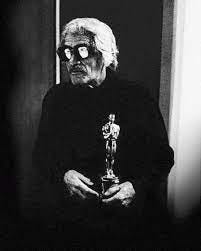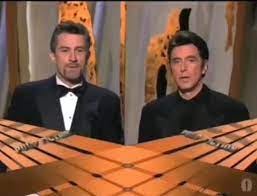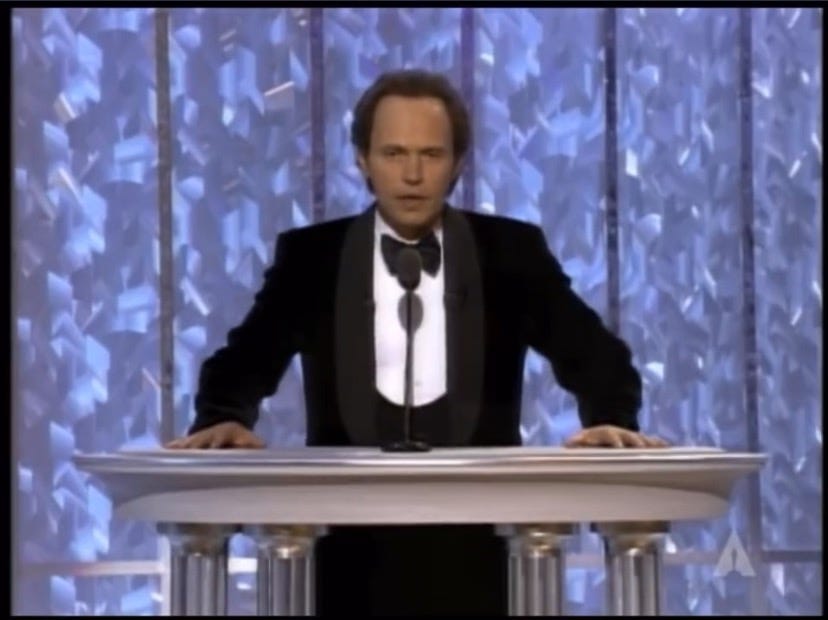My Life with Oscar
A look back at, and unnecessary justification of, my obsession with movie awards
I used to take the Academy Awards very seriously. That’s probably not so surprising or shameful if you know me at all, but what does make me rather abashed is the degree to which I used to ascribe them a great deal of meaning as an objective measure of quality or achievement. I was young, I was insecure, I was male, and I thought that the only way to impose any meaning to the world was to make sure that everyone agreed with me on all things and liked exactly what I liked – be they friends, potential romantic partners, or large amorphous bodies made up of a disparate collection of film professionals casting individual private votes - and to rail against what I saw as the brutal tide of injustice if they did not.
While I am still living within the prison that is masculinity, and am still to certain various degrees insecure (being that I live within the prison of masculinity and all), I am no longer by any measure young (unless we’re looking at that in the geological sense) and at this point the aggregated ravages of time and life experience, combined with the shifting of priorities that comes from being an adult, a husband, and a father have colluded to reshape my perspective on Hollywood’s Big Night. I still enjoy the show itself in all its pageantry (the gaudier the better), I still get more caught up than I should in the “competition” of it all (tracking likely contenders, keeping tabs on who’s ahead and who’s falling behind) even when I tell myself every year that I won’t this time because it ruins the surprise. But I don’t put much of any stock in the winners because I’ve come to accept that it doesn’t really matter all that much in the grand scheme of things. If anything, the results are completely beside the point – the true meaning and function of the awards, to the extent that there is any for those of us who are not giving or receiving them – has long been completed by the time the trophies are handed out.
This is, quite frankly, the ideal perspective, and the one that has allowed me to come to terms with my love for this goofy shit despite any internal conflict that may broil within over the frivolity or the corrosive nature of it all.

The Oscars were after all, for better or worse, my entrée to more serious cinema. The most shameful confession I may ever make in this newsletter is that as a 12-year-old movie fan I was rooting for Forrest Gump against Pulp Fiction during the 1995 ceremony. I couldn’t stay up late enough to watch in its entirety, so I cheered along to a VCR recording during the next morning’s breakfast hour as Al Pacino and Robert DeNiro - as engaged and excited as you’d imagine - crowned it that year’s victor.
This is the first time I consciously remember watching the ceremony. Is that because I was finally old enough to watch along with my mom and know/care what was going on? Because a movie I was rooting for was up for major awards? Because it was hosted by David Letterman? Perhaps all of the above. In any event, I was pleased at the time that Gump triumphed. But it was because of that year’s nominations, in addition to the overall hype for the movie itself, that I watched Pulp Fiction at all – an incremental yet pivotal first step towards more adult, complex fare that would develop in the coming years and be centered largely around films that were “in the hunt” for awards consideration.
Around this time, I started to become interested in the history of the awards and of the industry as a whole. I became obsessed with this book, obtained from our neighborhood Blockbuster, and as I tore through its pages and catalogued all that I had seen and had yet to see, I started to notice that for certain entries there was an awards pedigree listed. Based on this scattered info, I started going through and making lists of everything that had been nominated each year and in which category. This was still the cusp of the internet age and was well before our own house was ever connected, and so this was my first functional awards database. I quickly started buying books on the subject and filling in any remaining gaps in my own records, but for the first time as a movie-goer I had a specific mission - it became my official goal to see every film nominated.
This of course extended to each current year’s roster, as nomination morning would provide me with a prioritized list of what I needed to catch up on. I would do this on my own in some cases once I got a car – a tough beat trying to convince a group of 16-year-old dudes to come see Elizabeth with me – but I saw a lot of them with my mom. There was a sense of discovery here that was even more special because it was something I was sharing with her - some of my favorite movie-going memories are of us sobbing together as we walked out of a screening of Life is Beautiful, or the effervescent surprise of discovering something like Shakespeare in Love that wouldn’t necessarily have been on our radar.
And so, I had both a yearly list of things to see as well as a historical record of everything I needed to catch up on in order to be a Serious Movie Fan that each gave shape and structure to my viewing. This would of course expand in time – the AFI would soon start doing their annual lists of the Best American fill-in-the-blank of all time, and I had to seek and discover new structures for viewing and catching up on international and eventually more independent and experimental films. But the Oscars were the reason I saw eventual favorites like Fargo, LA Confidential, The Thin Red Line, Topsy-Turvy, In the Bedroom. I re-watched an incomplete taping of the ‘92 ceremony because the contained clips were all that I could see of The Silence of the Lambs1, that being one of the last films that my mother absolutely forbid me to see2. Maybe none of this is cool, but I was never in danger of being anything other than uncool – and not in a Lester-Bangs-in-Almost-Famous uncool-is-actually-cool way.
I also loved the Oscars because for a couple of months everybody was intensely interested in the thing that I was interested in. I grew away from sports for a few years once I realized I wasn’t good enough to ever play them professionally, and so in the years where I wasn’t following the Super Bowl or the World Series, the Oscars became My Thing. It was a huge family event – we made gluttonous spreads and started watching the red carpet at 6 o’clock (sometimes as early as 12). A long-standing acrimonious silence between me and my high school best friend was patched over in discussion of whether Steven Soderbergh would split his Best Director vote between Traffic and Erin Brockovich in 2001. My future wife first met my brother and his wife when I brought her to their apartment for the 2013 awards (where Argo, the movie we saw on our first date, was the eventual victor). The culture at large seemed to be invested as well – I remember headlines when 2006 brought a “rematch” in Best Director between Clint Eastwood and by-that-time notorious bridesmaid Martin Scorsese. While a part of me mourns what seems like a lack of centrality of the event in terms of the larger culture, I also look at the yearly discourse cycle and realize that maybe I like it better when less people care about what I care about.
Once I got into college, my relationship to the proceedings developed into something that was perhaps unhealthy, and because I had every year’s winner memorized, I would drunkenly demand that people at parties quiz me on my knowledge (fun for everybody!). I once got Very Angry Online when Eastwood beat Scorsese for Best Director in 2004. Historical perspective rears its head here again – if I were voting on that year today, I wouldn’t have nominated either. I gnashed my teeth and rent my garments when Crash prevailed over Brokeback Mountain the next year.
And yet, like a slow-building and more honestly-earned move away from religious upbringing it was not one traumatic event, one or even a number of catastrophic choices that disconnected me from the idea that these awards were Important. It was a slow-building realization that they were but one sliver of a bigger picture. Oscars allow the people who win and are nominated for them to do bigger things, but 1) oftentimes those bigger things are worse or less interesting and 2) these are decisions that we ultimately have no power over no matter how much we Complain Online.
These ceremonies are about rich people giving each other trophies, and as I have shifted into enjoying and appreciating them as such my relationship with them has become much healthier.
What other venue allows – nay, demands – that we compare the candy-colored pop feminism of a mainstream studio comedy like Barbie with the chilling, formalist austerity of Jonathan Glazer’s take on the Holocaust. How can I not get an absurdist thrill from the image of Martin Scorsese inevitably clapping politely in the audience while Billie Eilish’s brother beats him to a second Oscar? What other organization can work to tirelessly archive and champion the history of the cinematic arts and also force Tommy Lee Jones to watch Beavis and Butthead present an award?
But what I also still enjoy is the way that they center movies in the cultural conversation for a brief period of time. I’m excited to catch up on what I need to see – both on my own and with my wife. I look forward to comparing notes on what I’m watching with my colleagues and students, and I’m thankful for the immediacy those conversations get from these nominations. And I anticipate watching the awards, surrounded by friends and family, celebrating and condemning in equal measure results that I will forget in a year’s time while eating and drinking like a Tudor king.
-cs
This is what also brought me to writing of Syd Field, and thus my interest in screenwriting as a craft, as his Four Screenplays book detailed the plot so specifically that it was essentially my way of watching the film before I could actually watch it.
One night around this time I was babysitting my cousins during what turned out to be a free preview weekend for one of the major movie channels. I noticed that Lambs was airing later that night, and so after they were soundly asleep I watched it in secret only to find, when I came home, that she had decided to relent and taped that exact airing for me to finally watch.







